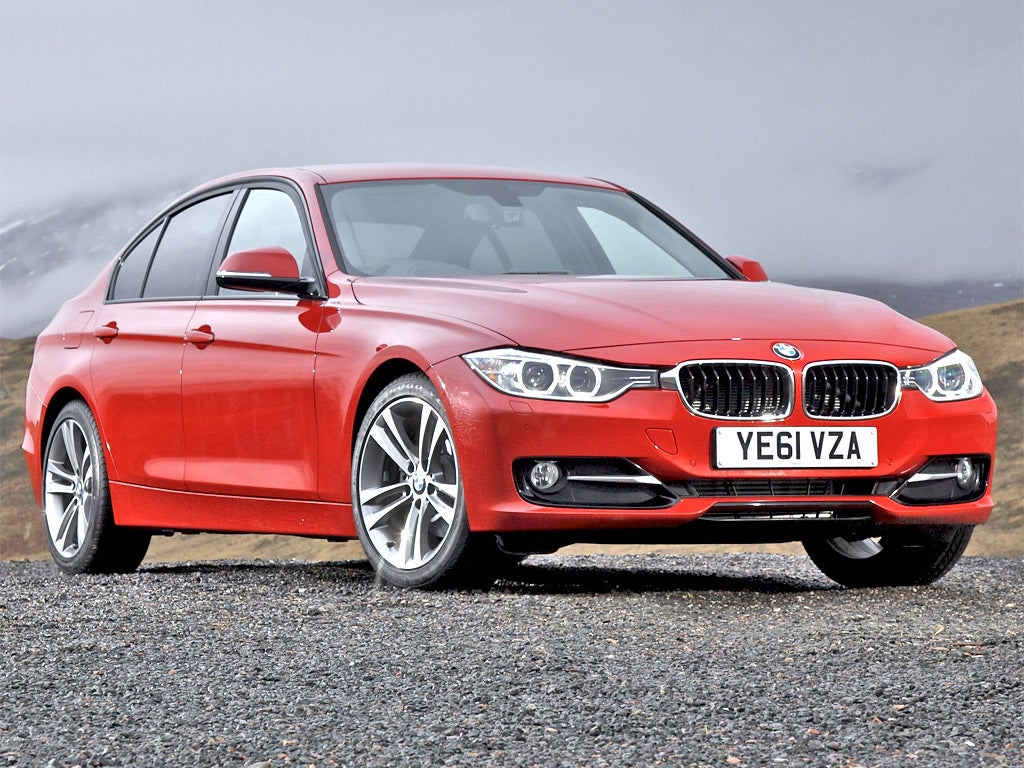BMW 3 Series
The car that goes from ZiL to 60 for two weeks

Price: from £24,880
As tested: 328i Modern (£30,065)
Engine capacity: 2.0-litre four-cylinder, twin-turbo
Top speed (mph): 155
0-60 mph (seconds): 5.7
Fuel economy (mph): 44.1
CO2 emissions (g/km): 149
If you live in London you can't help but have noticed the fleet of brightly coloured BMWs gliding along the city's increasingly busy Olympic lanes. Complete with the London 2012 logo there are 4,000 of the cars ferrying athletes, officials and VIPs from venues to their hotels and driving taxi drivers and cyclists mad in the process. The flagships of the fleet are 200 prototype electric models, but the vast majority of the Beamer army are 3 Series saloons.
One in every three BMWs sold worldwide is a 3 Series and after a week in the new F30 model, the latest incarnation of the compact executive car that BMW launched in 1975, it is easy to see why. Olympic passengers will ride in the latest diesel 320d model, but my test car was the sportier 328i and instead of the crowded streets of the capital I headed north to the long, open roads of the Lake District.
The car came with an eight-speed automatic gearbox (one of the best on the market), auto start-stop, brake-energy regeneration, variable sports suspension and drive performance control which offers the choice of Eco Pro, Comfort, Sport and Sport Plus modes. All this technology shows. In Sports Plus mode, and without the help of traction control, it is a manic way to cover ground quickly at the expense of tyre rubber, but engage its Eco Pro mode and with altered throttle mapping it's an eco-friendly joy that's as smooth as silk to drive and ideal to get IOC President and working-class hero Jacques Rogge to his luxury hotel room in time for pre-dinner cocktails. He'd be comfortable, too; the ride is relaxed and absorbs bumps in the road with ease, while the leather seats seem to have been lifted from a Bentley.
BMWs in Olympic service will be in use for up to 18 hours a day. That should mean some pretty hefty emissions, but BMW has worked hard to bring its CO2 levels down. The Olympic fleet will average an impressive 116g/km, thanks mainly to the use of smaller diesel engines (these emit other air-quality nasties) and new electric models. BMW isn't without its detractors, though. In the past the company lobbied against European Commission proposals for a tougher limit on carbon emissions from new cars and many in the green lobby are unhappy that a rival bid from Nissan (the company offered a fleet made up of 50 per cent electric cars) was rejected.
The real problem for buyers is that unless you're an IOC official you'll need a sponsorship deal that would make Victoria Pendleton blush to afford a really desirable 3 Series. Yes, the basic model starts at £24k but, if you strip the extras, equipment levels are rather meagre compared with some of its less prestigious rivals. Even an armrest (not the most luxurious of fittings) will cost you an extra £120. I mean, come on, where does BMW get off charging you that much for such a utilitarian component?
Avoid all the extras – the fancy gearbox, adaptive suspension, luxury trim and leather seats come in at £4,020 – and you're left with a far less sumptuous and sporty car. Not that it's bad; the engine is great, it is still more than comfortable enough and the Olympic drivers – they are all unpaid volunteers – will no doubt enjoy their time behind the wheel in London's ZiL lane. It's just that, when stripped bare, it's more like Usain Bolt on a bad day than the Olympian at his best. That said, he's still a gold-medal winner.
Join our commenting forum
Join thought-provoking conversations, follow other Independent readers and see their replies
Comments
Bookmark popover
Removed from bookmarks